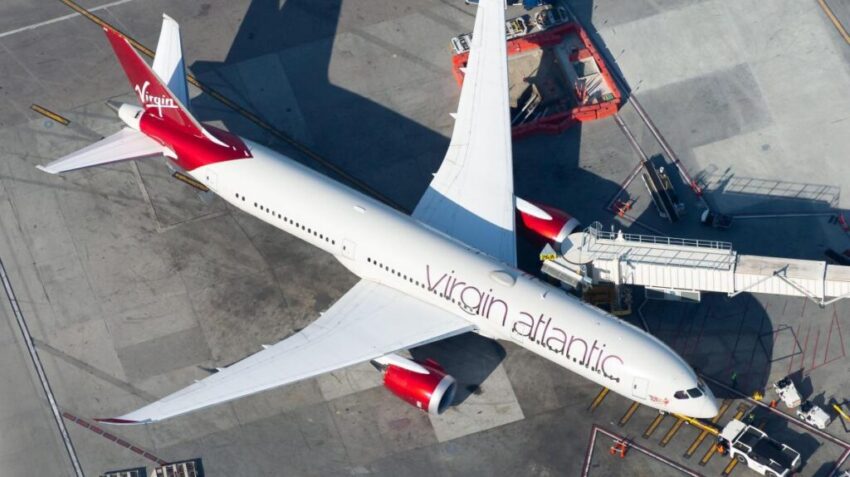Virgin Atlantic is to cut a further 1,150 jobs and put another 600 cabin crew on extended furlough beyond October, despite securing a £1.2bn rescue plan that was signed off by a US court on Thursday night.
Virgin said the job losses, on top of 3,150 already announced since March, were “heartbreaking, but essential” to ensure its survival, with international travel recovering more slowly than expected.
On Thursday, the airline gained court approval for its refinancing package, designed to see it through at least the next 18 months. The package includes a pledge of £200m from Sir Richard Branson’s Virgin Group, the airline’s biggest shareholder, and creditors agreeing to reduce and defer Virgin Atlantic’s debts.
The airline will start flights to Pakistan in an attempt to revive business, with its main US routes still largely blocked to international travellers.
Shai Weiss, Virgin Atlantic’s chief executive, said it was a bittersweet day: “Together we have achieved what many thought impossible… The completion of the private-only, solvent recapitalisation of Virgin Atlantic removes much of the uncertainty we faced and represents a major step forward in our fight for survival.”
He added: “After the sacrifices so many of our people have made, further reducing the number of people we employ is heartbreaking, but essential for survival.”
The company will fund its own furlough scheme for the 600 crew from October should the government’s job retention scheme not be extended.
The Unite union said news of more job losses was “a searing indictment of the cavalier way that the government has treated the aviation sector, which is key to the health of the British economy.”
Weiss said it was crucial that passenger tests for Covid-19 were introduced to end travel restrictions and quarantine, while protecting public health. He urged the government to push for trials of a travel corridor to New York, with coronavirus infection rates similar to the UK. “The US is essential to us, and the economic recovery cannot take off without that border opening up. If travel is curtailed next summer, it is not just Virgin Atlantic, it is the country’s problem.”
The refinancing scheme, announced in July after Virgin’s attempts to solicit government help were rebuffed, was rubber-stamped by both UK and US courts this week after creditors voted to accept a 20% haircut and defer repayments from the airline, worth around £450m. The shareholders, Branson’s Virgin Group and US carrier Delta, have also deferred £400m in payments, and credit card companies have agreed to support the deal and keep funds flowing. One new investor, US private equity fund Davidson Kempner, will put in £170m.
Aviation industry analysts said Virgin’s long-term future remained far from clear. Andrew Lobbenberg, of HSBC, said: “They are getting new hard cash of less than £400m which, in the context, isn’t that much. It’s not clear that they have got that much liquidity, and the scale of the challenge is large.”
Although full details of the recapitalisation have not been made public, it is assumed that Davidson Kempner’s investment has been guaranteed against Virgin’s Heathrow landing and departure slots, once valued up to £50m a pair.
John Strickland, of JLS consulting, said the Heathrow slots ensured Virgin’s part in what was normally a very profitable transatlantic market: “But right now that US market has more or less closed. On paper the slots are an asset for the future; but at present it’s impossible to define what that future value might be.
“For all airlines, long-haul flying is going to be a long time in recovery, with less high-profit margin business travel – a large amount of that capacity is not coming back,” he added.
Lobbenberg warned: “This deal looks like it will get Virgin through the winter … but it’s unclear what will happen next year. It’s highly leveraged and has no unencumbered assets. The survival of the business is self-evidently not in their hands – it needs the long-haul market to reopen.”
Weiss told the Guardian that the Virgin plan was predicated on as little as 25% of its capacity returning by the end of 2020, and revenues in 2021 to be just half of 2019’s, with the US market, 70% of Virgin’s business, unlikely to reopen fully until next year.
Weiss said the airline would be less than half its pre-Covid size, with a dramatically lower cost base, and hinted that it would be a more austere outfit than in Branson’s heyday. “The thing that makes Virgin Atlantic is not the glitz and the glamour, it’s the heart and soul,” he said.


